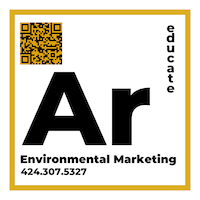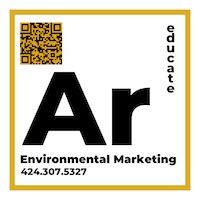A Lesson in Environmental Education-Based Marketing
“A $1 trillion market opportunity exists for companies that can successfully explain their sustainability efforts to consumers, according to a study from Unilever.” – Baldino, 2017.
Often, companies separate educational efforts from marketing efforts. These two things are seen as part of different “buckets” or departments. What happens when a green business who truly offers sustainable solutions doesn’t implement Environmental Marketing? They fail. They fail to realize that in order to have a successful marketing campaign; they will need an educated consumer/buyer. They fail at utilizing the one asset uniquely placed in their possession worth literally $1 trillion dollars (current market gap) that bigger greenwashed brands can never compete with. This is, the ability to be transparent, the ability to tell the truth, the ability to educate.
Education-based marketing is not a new concept; it’s something that has been done in the early years of John Deere and other companies that saw the value in a people-centric movement and discovered where their brand could create that connection, a connection which keeps on giving and thus, lasts. These companies who’ve invested in people, in educating them, in engaging them in a genuine way beyond a basic ad, beyond a PR stunt, beyond an influencer campaign, or even beyond traditional marketing itself, have been in business for nearly 200 hundred years. They were built on the idea of community enrichment, offering the best solutions, and ultimately support and education.
Environmental Marketing goes far beyond the greenwashing efforts we see today that fall flat in every way possible. People, especially Millennials, are not buying the plastic pitch anymore, no matter how hard coke tries to spin plastic jeans into an environmental campaign. There is no real movement of people because there is no real movement; turning plastic into jeans as a “green campaign” is merely greenwashing. Say that three times quickly. Try as they may, greenwashed corporate brands are a) falling flat on their promises and b) tanking trust with consumers on green efforts.

Market value for B2B and B2C sustainability solutions exceed the trillion-dollar mark. In the summer of 2019, the largest living generation switched from the Baby Boomer Generation to Millenials, who value sustainability at a rate higher than any other generation thus far. Millennials are the most educated generation in U.S. history, and therefore pay great heed to brands that help them learn more, uplift their quality of life, and lower their impact on their environment.
This is where the value of environmental education comes in. It’s a much bigger picture agenda and moves beyond the thinking of a “marketing strategy.” It’s an embedded ethos for a green company, their offerings, and is a pathway to make genuine shifts for the betterment of our environment and economy.
What is Green Content Marketing?
Green Content Marketing is a type of content marketing that includes environmental education and awareness as an integral part of a marketing campaign aimed to raise the knowledge level of average consumers about environmental issues; not greenwashing.
Why the $1 Trillion Gaps Exists for Brands & Consumers
Environmental degradation is on a steep incline, and so are the news stories that cover issues such as climate change events, the Great Pacific Garbage Patch, and China’s ban on importing plastic garbage. With this increase in awareness of the environmental problems plaguing our planet, the motivation for solving these problems is also on the rise. It may be challenging to solve such large-scale problems. However, most people realize that many of these issues are human-caused and can be course-corrected with the right choices moving forward. Increasingly, people are beginning to see that their purchasing habits are supporting a system of environmental degradation. The motivation to make changes on these issues comes from education and options to change their ways. However, marketing in the form of effective, transparent environmental education is lacking for consumers to make educated decisions. So, they sit on the sidelines and look away while major brands greenwash. This leaves us with an 80% plus group of eager to buy consumers, unable to get the information they need to make better choices.
The reasons consumers are in desperate need for environmental education
- Consumers are tired of greenwashing and are looking for real solutions
- There’s a desire to make better choices, without the knowledge to effectively do so
- There’s a lack of in-depth environmental education in K-12 schools
- Complacent media that spotlights soundbites, instead of genuine environmental issues
- Tired greenwashed marketing by major brands is becoming outdated
- Consumers want to connect with unsung green hero businesses that are truly solving environmental problems
- Millennials who are now the largest adult population, value education, and value companies who effectively deliver it

The Value of Environmental Education
- Uses marketing dollars for education and increases public good
- Millennials value sustainable brands that can convey their solutions
- Millennials value education and brands that can deliver a genuine and informative marketing message
- Uplifts a brand into the territory of genuine problem solvers
- Goes beyond the confines of greenwashing
- Can be used as a vehicle for grassroots lobbying efforts
- Drives down PR and Advertising dollars as consumers begin to seek out and uplift your brand
Conclusion: Environmental Problem Solving & Big Returns Go Hand-in-Hand, Every Environmental Company Must Commit to Environmental Education for B2B and B2C Customers
It is not enough for a marketing or PR agency to think you have a “great” product and want to take your company on as a client because they believe in your cause. Often, this is the downfall of many marketing relationships for green companies. Marketers must go beyond the feel-good factor for green products and elevate above sustainability as a sound bite. The bigger picture environmental issues behind a product or service must be deeply and scientifically understood, lest great marketers take on greenwashed products and create the same planetary mess we’re in today. What must be understood deeply are the enormous impacts businesses are having on biodiversity, ecosystem health, weather patterns, cradle to grave, and environmental justice issues, to name a few.
Want to learn more?
[su_button url=”https://armarketinghouse.com/form-to-download-the-white-paper/” target=”blank” style=”flat” background=”#dcae1d” size=”7″]DOWNLOAD THE WHITE PAPER[/su_button]
We hope this article allows you to consider how your environmentally-focused business or organization can build a pathway to the $1 trillion market opportunity with the utmost integrity. If you are looking for a dedicated team or for help to support your current team, we’re here to build out your journey. Give us a shout and let’s get to work! People and the planet are desperately waiting.
Resources
https://www.unilever.com/news/press-releases/2017/report-shows-a-third-of-consumers-prefer-sustainable-brands.html
https://www.theguardian.com/sustainable-business/rubbish-jeans-levis-plastic-fashion


